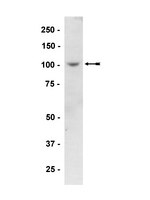The cytotoxic effects of regorafenib in combination with protein kinase D inhibition in human colorectal cancer cells.
Wei, N; Chu, E; Wu, SY; Wipf, P; Schmitz, JC
Oncotarget
6
4745-56
2015
Show Abstract
Metastatic colorectal cancer (mCRC) remains a major public health problem, and diagnosis of metastatic disease is usually associated with poor prognosis. The multi-kinase inhibitor regorafenib was approved in 2013 in the U.S. for the treatment of mCRC patients who progressed after standard therapies. However, the clinical efficacy of regorafenib is quite limited. One potential strategy to improve mCRC therapy is to combine agents that target key cellular signaling pathways, which may lead to synergistic enhancement of antitumor efficacy and overcome cellular drug resistance. Protein kinase D (PKD), a family of serine/threonine kinases, mediates key signaling pathways implicated in multiple cellular processes. Herein, we evaluated the combination of regorafenib with a PKD inhibitor in several human CRC cells. Using the Chou-Talalay model, the combination index values for this combination treatment demonstrated synergistic effects on inhibition of cell proliferation and clonal formation. This drug combination resulted in induction of apoptosis as determined by flow cytometry, increased PARP cleavage, and decreased activation of the anti-apoptotic protein HSP27. This combination also yielded enhanced inhibition of ERK, AKT, and NF-κB signaling. Taken together, PKD inhibition in combination with regorafenib appears to be a promising strategy for the treatment of mCRC. | 25544765
 |
Protein kinase d as a potential chemotherapeutic target for colorectal cancer.
Wei, N; Chu, E; Wipf, P; Schmitz, JC
Molecular cancer therapeutics
13
1130-41
2014
Show Abstract
Protein kinase D (PKD) signaling plays a critical role in the regulation of DNA synthesis, proliferation, cell survival, adhesion, invasion/migration, motility, and angiogenesis. To date, relatively little is known about the potential role of PKD in the development and/or progression of human colorectal cancer. We evaluated the expression of different PKD isoforms in colorectal cancer and investigated the antitumor activity of PKD inhibitors against human colorectal cancer. PKD2 was the dominant isoform expressed in human colon cancer cells. PKD3 expression was also observed but PKD1 expression, at both the RNA and protein levels, was not detected. Suppression of PKD using the small molecule inhibitors CRT0066101 and kb-NB142-70 resulted in low micromolar in vitro antiproliferative activity against multiple human colorectal cancer cell lines. Drug treatment was associated with dose-dependent suppression of PKD2 activation. Incubation with CRT0066101 resulted in G(2)-M phase arrest and induction of apoptosis in human colorectal cancer cells. Further studies showed that CRT0066101 treatment gave rise to a dose-dependent increase in expression of cleaved PARP and activated caspase-3, in addition to inhibition of AKT and ERK signaling, and suppression of NF-κB activity. Transfection of PKD2-targeted siRNAs resulted in similar effects on downstream pathways as observed with small molecule inhibitors. Daily administration of CRT0066101 resulted in significant inhibition of tumor growth in HCT116 xenograft nude mice. Taken together, our studies show that PKD plays a significant role in mediating growth signaling in colorectal cancer and may represent a novel chemotherapeutic target for the treatment of colorectal cancer. | 24634417
 |
Mechanism of activation of protein kinase D2(PKD2) by the CCK(B)/gastrin receptor.
Sturany, Sabine, et al.
J. Biol. Chem., 277: 29431-6 (2002)
2002
Show Abstract
Recently, we cloned a novel serine/threonine kinase termed protein kinase D2 (PKD2). PKD2 can be activated by phorbol esters both in vivo and in vitro but also by gastrin via the cholecystokinin/CCK(B) receptor in human gastric cancer cells stably transfected with the CCK(B)/gastrin receptor (AGS-B cells). Here we identify the mechanisms of gastrin-induced PKD2 activation in AGS-B cells. PKD2 phosphorylation in response to gastrin was rapid, reaching a maximum after 10 min of incubation. Our data demonstrate that gastrin-stimulated PKD2 activation involves a heterotrimeric G alpha(q) protein as well as the activation of phospholipase C. Furthermore, we show that PKD2 can be activated by classical and novel members of the protein kinase C (PKC) family such as PKC alpha, PKC epsilon, and PKC eta. These PKCs are activated by gastrin in AGS-B cells. Thus, PKD2 is likely to be a novel downstream target of specific PKCs upon the stimulation of AGS-B cells with gastrin. Our data suggest a two-step mechanism of activation of PKD2 via endogenously produced diacylglycerol and the activation of PKCs. | 12058027
 |
















